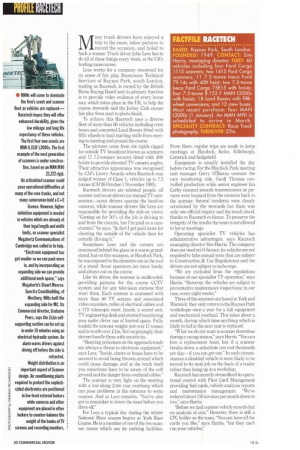M any truck drivers have enjoyed a trip to the races,
Page 32

If you've noticed an error in this article please click here to report it so we can fix it.
taken pictures to record the occasion, and failed to back a winner. Truck driver John Lees has to do all of these things every week, at the UK's leading racecourses.
Lees works for a company renowned for its sense of fair play. Racecourse Technical Services of Raynes Park, south London, trading as Racetech. is owned by the British Horse Racing Board and its primary function is to provide video evidence of every horse race which takes place in the UK, to help the course stewards and the Jockey Club ensure fair play from start to photo-finish.
To achieve this Racetech uses a diverse fleet of more than 60 vehicles including crew buses and converted Land Rovers fitted with fifth wheels to haul starting stalls from meeting to meeting and around the course.
The pictures come from six rigids rigged for outside TV broadcast known as scanners and 17 7.5-tonners (scouts) fitted with 40ft hoists to provide elevated TV camera angles. Their attractive appearance was recognised by CM's Livery Awards when Racetech was judged winner of Class 1, vehicles up to 7.5 tonnes (CM 26 October-1 November 1995).
Racetech drivers are talented people: all scanner and scout drivers are trained TV cameramen—scout drivers operate the head-on cameras, while scanner drivers like Lees are responsible for providing the side-on views: "Getting on for 50% of the job is driving to and from the circuits, but I'm paid as a cameraman," he says. "In fact I get paid more for cleaning the outside of the vehicle than for actually driving it."
Sometimes Lees and his camera are ensconced behind the glass in a warm grandstand, but on this occasion, at Haydock Park, he was exposed to the elements out on the roof of a stand. Scout operators are more hardy, and always out on the course.
Like its driver, the scanner is multi-roled, providing pictures for the course CCTV system and for any television stations that want them. Each scanner is crammed with more than 40 TV screens and associated video recorders, miles of electrical cables and a 17ft telescopic mast. Inside, a sound unit. TV engineering desk and steward monitoring area make clever use of limited space. Fully loaded, the scanner weighs just over 11 tonnes and is worth over Elm. Not surprisingly, their drivers handle them with sensitivity.
"Sleeping policemen on the approach roads are always a threat to electronic equipment," says Lees. "Inside, chairs or boxes have to be secured to avoid being thrown around which could cause damage, and at the track itself you sometimes have to be aware of the soft ground and the danger from overhead cables."
The scanner is very light on the steering with a low-slung 2.4m rear overhang which can pose problems at the entrance to some courses. And as Lees remarks, "You've also got to remember to lower the mast before you drive off"
For Lees a typical day during the winter National Hunt season begins at York Race Course. He is a member of one of the two scanner teams which use its parking facilities.
From there, regular trips are made to jump meetings at Haydock, Kelso, Edinburgh, Catterick and Sedgefield.
Equipment is. usually installed the day before racing. Fior the Haydock Park meeting unit manager Gerry O'Bierne oversaw the race monitoring side. Geoff Thomas controlled production while senior engineer Ian Carby ensured mooth transmissions as pictures were beamed from the cameras back to the scanner. Several incidents were closely scrutinised by the stewards but there was only one official l inquiry and the result stood, thanks to Racetech evidence. To preserve the integrity of the results the team is not allowed to bet at meetings.
Operating skcialist TV vehicles has administrative advantages, says Racetech managing director Sim Harris. The company does not need an 0-licence; its vehicles are not required to take annual tests (but are subject to Construction & Use Regulations) and the drivers are not subject to tacho regs.
"We are excluded from the regulations because of our sbecialist TV operation," says Harris. "However, the vehicles are subject to preventative maintenance inspections; in our case, every eight weeks."
Three of the scanners are based at York and Warwick: they only return to the Raynes Park workshops once a year for a full equipment and mechanical overhaul. This takes about a month, during which time anything which is likely to fail in the next year is replaced.
"What we do not want is scanner downtime during a racing season," says Harris. "You can hire a replacement hoist, but if a scanner breaks down, a substitute can cost thousands per day—if you can get one." In such circumstances a disabled vehicle is more likely to be moved to its nexit job on the back of a trailer rather than being up in a workshop.
Racetech has recently streamlined its operational control with Fleet Card Management providing fuel cao.-ds, vehicle analysis reports and maintenance management. "We've reduced about 150 invoices per month down to two," says Harris.
"Before we had copious vehicle records hut no analysis of cdst." However, there is still a CPC holder on the team. "You can have all the cards you like," says Harris, "but they can't run your vehicles."
































































































